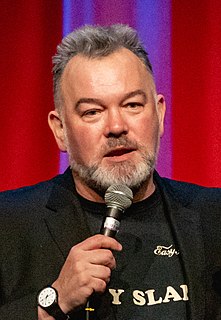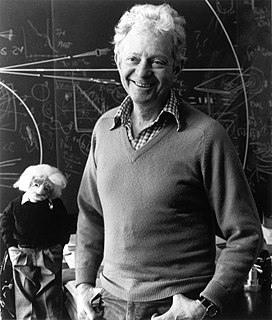A Quote by Peaches Geldof
You know what I'm intrigued by? Like, space and wormholes and Stephen Hawking's theories and Richard Dawkins's theories. That's what I care about.
Related Quotes
I made a film called "The Theory of Everything," which is based on Jane Hawing, who was married to Stephen Hawking - it's based on her book about their relationship.That's what the film will be about - they were both incredible, strong, willful individuals and I feel like that Stephen Hawking himself would say that he wouldn't have survived without the influence of Jane Hawking, and they were an incredible team together.
Our minds are specifically adapted to developing certain theories, and we have a science if the theories that are available to our minds happen to be close to true. Well, there is no particular reason to suppose that the intersection of true theories and theories that are accessible to the mind is very large. It may not be very large.
In the past few months I've become religious, I've started to believe in god, creationism and intelligent design, and the reason that I now believe in god and creationism and intelligent design is because of Professor Richard Dawkins. Because when I look at something as complex and intricate and beautiful as Professor Richard Dawkins, I don't think that just could've evolved by chance! Professor Richard Dawkins was put there by god to test us, like fossils. And facts.
There are varieties of theories of revolution. According to one of these theories, only one of these theories, revolutions occur when there is an explosion of rising expectation. And amongst the lower strata in Iranian society, we are witnessing an increasing rise of the expectation and it's clear that the regime is incapable of satisfying these demands.
Scientific theories need reconstruction every now and then. If they didn't need reconstruction they would be facts, not theories. The more facts we know, the less radical become the changes in our theories. Hence they are becoming more and more constant. But take the theory of gravitation; it has not been changed in four hundred years.
It is rational to choose the right means to your ends to develop very elegant abstract formal theories of rational choice, and then turn these into what look like moral theories. Philosophers tend to be ravished by the formal beauty of such theories, and they don't pay much attention to the fact that our human limitations make them pretty useless in practice, while the simple point about instrumental reasoning is too shallow to be of much real moral interest.
Once again, my colleague Stephen Hawking has upset the apple cart. The event horizon surrounding a black hole was once though to be an imaginary sphere. But recent theories indicate that it may actually be physical, maybe even a sphere of fire. But I don't trust any of these calculations until we have a full-blown string theory calculation, since Einstein's theory by itself is incomplete.
One of the most difficult features of direct experience is that it is unfiltered by any theories or expectations. It's hard to observe without imposing a theory to explain what we're seeing, but the trouble with theories, as Einstein said, is that they explain not only what is observed, but what can be observed. We start to build expectations based on our theories.
Because those who hold conspiracy theories typically suffer from a crippled epistemology, in accordance with which it is rational to hold such theories, the best response consists in cognitive infiltration of extremist groups. Various policy dilemmas, such as the question whether it is better for government to rebut conspiracy theories or to ignore them, are explored in this light.

































